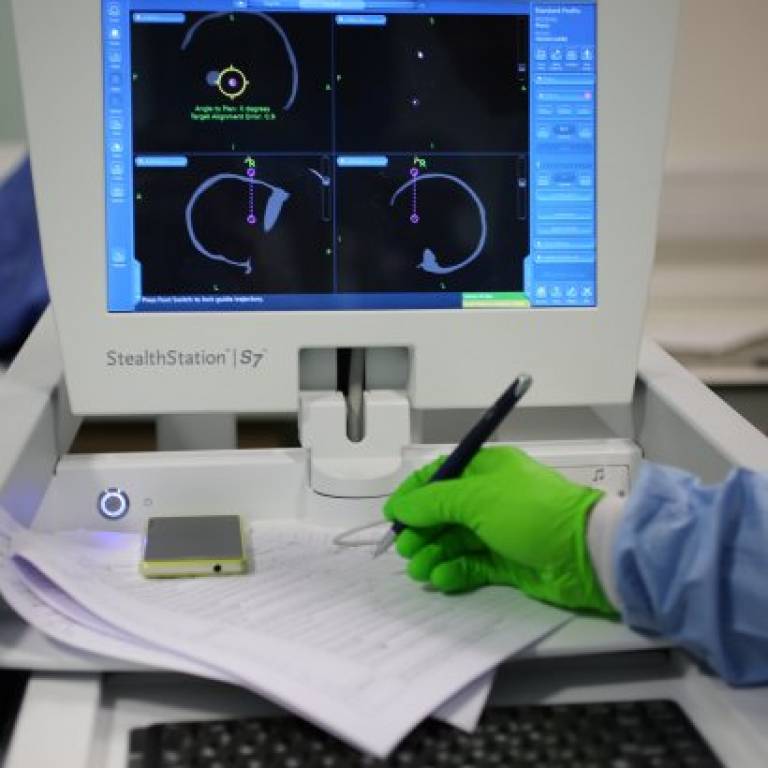New Wellcome/EPSRC Centre for Surgical and Interventional Sciences established at UCL
2 January 2018
UCL received over £13m from Wellcome and the Engineering and Physical Sciences Research Council (EPSRC) for a new surgical interventions centre led by the Institute of Healthcare Engineering

The newly established Wellcome/EPSRC Centre for Surgical and Interventional Sciences at UCL will bring together a wide team of engineering and clinical experts working to develop new surgical technologies.
In particular, the Centre will advance engineering sciences in intraoperative imaging and sensing, data fusion and extraction, human-technology interfaces, tissue modelling, interventional instrumentation and surgical navigation. The research will be developed with a wide range of clinical applications in mind, including vascular, paediatric, ophthalmic, neurological and prostate surgical interventions.
These advances will create an intuitive and highly personalised surgical platform that enables more precise, less invasive procedures. Greater precision will also mean more patients will be viable for complicated but life-altering surgery and those treated will benefit from safer, more localised treatments and a shorter recovery time in hospital.
Centre Director, Professor Sebastien Ourselin, said:
“Being able to apply our excellence in engineering to the field of surgical and interventional sciences will allow us to come up with truly innovative solutions to the range of clinical problems surgeons face. Our research will be developed in close collaboration with UCL’s six specialist research hospitals to ensure we are producing world-class, high-impact results.”
Building on the combination of research from the Institute of Healthcare Engineering and the National Institute for Health Research University College London Hospitals Biomedical Research Centre, the support of this new funding will allow for significant progress in this field.
Professor Bryan Williams, BRC Director, said: “The new centre builds on the partnership between clinicians at University College London Hospitals and scientists at UCL and will become a truly world leading centre for translating cutting edge surgical innovations into new and more precise surgical treatments for patients. This is great news for patients, the NHS and life sciences industries in the UK.”
The Centre will be based at Charles Bell House, which is undergoing refurbishment as part of Transforming UCL. The new space will house state of the art facilities, allowing researchers from the Institute of Healthcare Engineering, the Division of Surgery and Interventional Sciences and the Centre for Medical Imaging to combine expertise on this ambitious project.
Professor David Price, UCL Vice-Provost (Research), said:
“These centres are designed to deliver world-leading research and high-impact translation into healthcare. The Wellcome EPSRC Centre for SIS exemplifies the promise of the collaborative, cross-disciplinary research we strive for at UCL, by bringing together such a diverse mix of research disciplines to work on a common goal.”
Research in specific areas will be co-located with specialist hospitals associated with UCL to ensure fast translation of technology to the clinic. These include University College Hospital, National Hospital for Neurology and Neurosurgery, Royal Free Hospital, Great Ormond Street Hospital, Royal National Orthopaedic Hospital and Moorfields Eye Hospital.
The fundamental research themes which will link the Centre’s interdisciplinary and cross-faculty groups include:
- Physiological Navigation, focusing on fusing anatomical, physiological and pathological information for real-time interventional guidance and monitoring;
- Clinical Experience, focusing on optimising the cognitive and ergonomic workload of the entire clinical team;
- Precision Instrumentation, focusing on designing interventional medical devices that both sense physiological and pathological information and interact with tissue to deliver therapy.
Wellcome’s Director Dr Jeremy Farrar said: “Wellcome Centres play a special role in the global research ecosystem. By creating places where researchers can flourish we can catalyse world-leading research and translation, and amplify its influence and impact. At Wellcome we believe in long term support for discovery-driven science, and Wellcome Centres are an outstanding environment for researchers to further our understanding of fundamental biology, accelerate translation to clinical practice, and explore the social and cultural context of medicine.”
EPSRC’s Chief Executive, Professor Philip Nelson, said: “The new centre will bring together a wide range of experts to develop technologies that could have a profound impact on both the patient experience and outcome, as well as the workload of clinical teams. This investment demonstrates EPSRC’s commitment to addressing high priority healthcare challenges by working in partnership with other organisations and providing support for environments that promote multidisciplinary research and training.”
For more information please visit the Centre website.
 Close
Close

